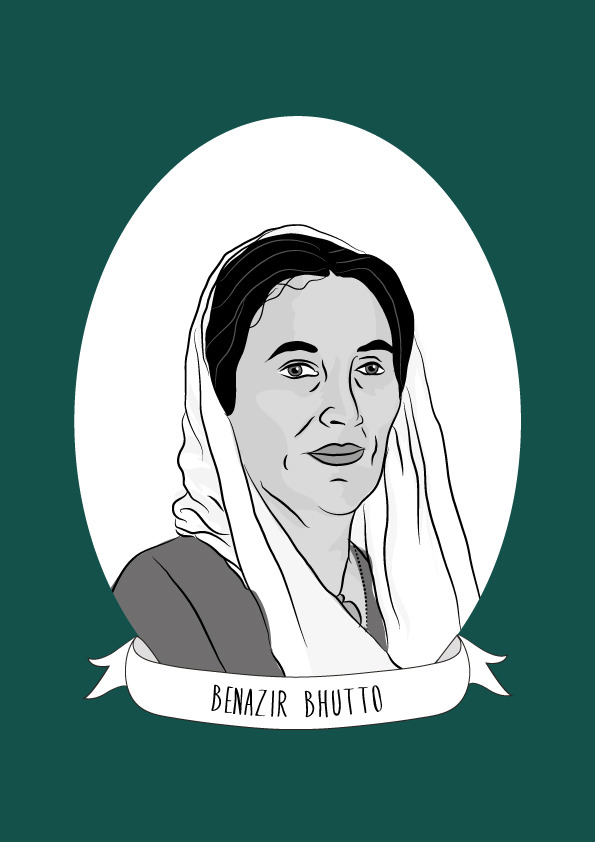Benazir Bhutto was a Pakistani politician who became the first woman leader of a Muslim nation in modern history. She was assassinated in 2007.
Bhutto was born in Karachi, Pakistan former Prime Minister Zulfikar Ali Bhutto, who was from Sindhi Rajput ethnicity and Begum Nusrat Ispahani, of Iranian Kurdish descent. Bhutto’s mother’s Kurdish culture played a big role in her later becoming the Prime Minister.
Bhutto left Pakistan at 16 to study at Harvard’s Radcliffe College where she graduated with a BA with cum laude honours in Comparative Government. Her time there formed the very basis of her belief in democracy. She then attended Oxford University, where she was awarded with a degree in Philosophy, Politics, and Economics, she also completed additional courses in International Law and Diplomacy. While at Oxford she was elected president of the Oxford Union, becoming the first Asian woman to head the prestigious debating society.
In 1977 Bhutto returned to Pakistan. After a military coup led by General Mohammad Zia ul-Haq her father’s government were overthrown and she was placed under house arrest. One year after Zia ul-Haq became president in 1978, Bhutto’s father was hanged after being convicted on charges of authorising the murder of an opponent. She became the leader of the Pakistan People’s Party (PPP). Bhutto endured frequent periods of house arrest from 1979 to 1984 and lived in exile in England from 1984 to 1986 where she founded an underground organisation to resist the military dictatorship. In 1985 she briefly returned to Pakistan for the burial of her brother, she was promptly arrested for participating in anti-government rallies.
Bhutto returned to Pakistan in 1986 after martial law was lifted, she quickly became the foremost figure in the political opposition to Zia ul-Haq. In august 1988 President Zia died in a mysterious plane crash. In the elections that followed Bhutto’s PPP won the single largest bloc of seats in the National Assembly. She was elected as prime minister on Dec. 1, 1988, heading a coalition government and becoming the first ever female prime minister of a Muslim nation. She was also one of the youngest chief executives in the world, being only 35 at the time.
Two years into her first term, Bhutto was dismissed from office by President Ghulam Ishaq Khan, citing charges of corruption. Bhutto initiated an anti-corruption campaign, and in 1993 was re-elected as Prime Minister. While in office, she brought electricity to the countryside and built schools all over the country. She made hunger, housing and health care her top priorities, working to modernise Pakistan. Bhutto faced constant opposition from the Islamic fundamentalist movement. In 1996 renewed allegations of corruption, economic mismanagement, and a decline of law and order led to her government being dismissed in November 1996 by President Farooq Leghari.
Bhutto attempted a re-election bid in 1997 but failed. Bhutto and her husband, the controversial businessman and senator Asif Ali Zardari was imprisoned on charges of corruption , a decision overturned by the Supreme Court in 2001 because of evidence of governmental interference. Bhutto was forced to once again live in exile, she returned to London for nine years, continuing to advocate for the restoration of democracy after the Gen. Pervez Musharraf’s seizure of power in a 1999 coup d’état. in 2007, after death threats from radical Islamists and the hostility of the government, she returned to Pakistan. President Musharraf granted her amnesty on all corruption charges.
Bhutto was greeted by crowds of enthusiastic supporters but the event ended in tragedy when her her motorcade was attacked by a suicide bomber, killing more than 100 bystanders. National elections were due for January 2008 and the PPP were poised to win, making Bhutto prime minister once again. Weeks before the election at a campaign rally in Rawalpindi, a gunman fired at her car before detonating a bomb, killing himself and more than 20 bystanders. Bhutto was rushed to the hospital, but died from her injuries.
Hundreds of thousands of mourners paid their respects to former Pakistani Prime Minister Benazir Bhutto at her funeral on December 28, 2007. She was buried at her family’s mausoleum in Garhi Khuda Bakhsh, the southern province of Sindh. Pakistani President Pervez Musharraf announced three days of mourning.
